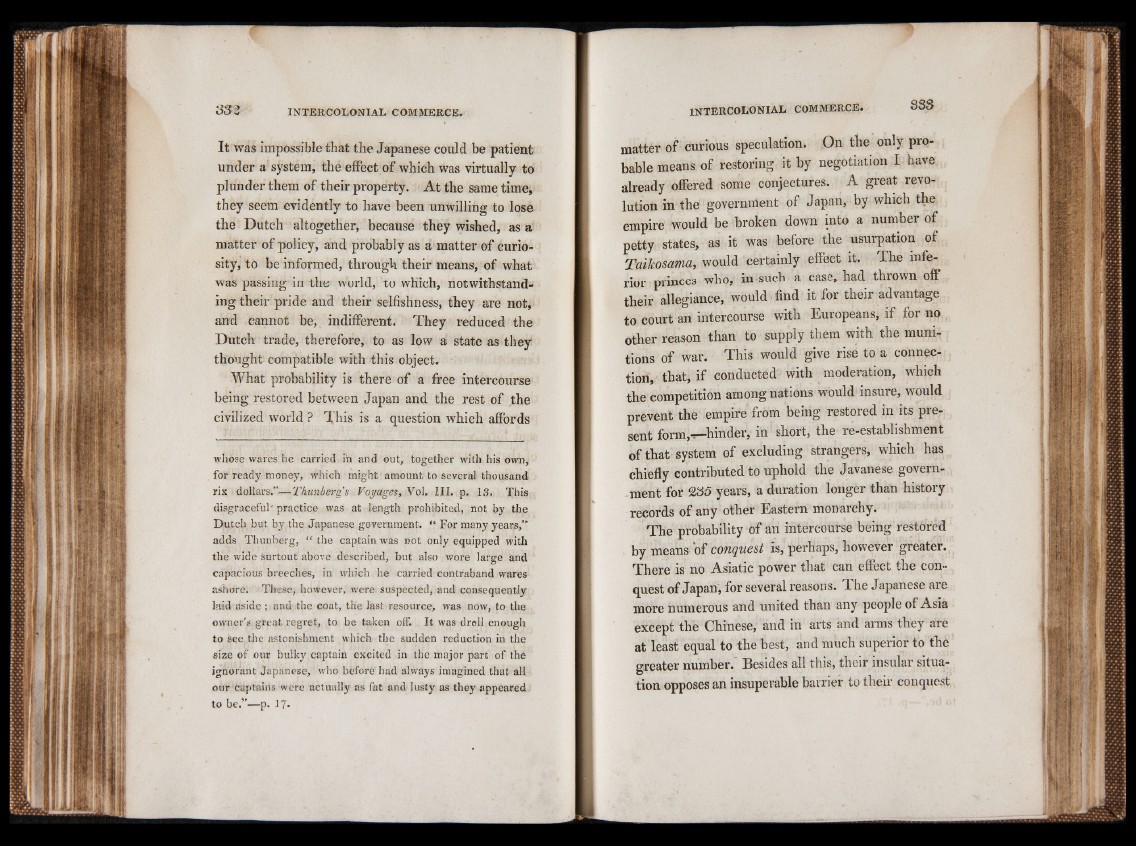
It was impossible that the Japanese could be patient
under a' system, the effeet of which was virtually to
plunder them of their property. A t the same time,
they seem evidently to have been unwilling to lose
the Dutch altogether, because they wished, as a
matter of policy, and probably as a matter of curiosity,
to be informed, through their means, of what
was passing in the world, to which, notwithstanding
their pride and their selfishness, they are not,
and cannot be, indifferent. They reduced the
Dutch trade, therefore, to as low a state as they
thought compatible with this object.
What probability is there of a free intercourse
being restored between Japan and the rest of ¿he
civilized world ? This is a question which affords
whose wares he carried ih and out, together with his own,
for ready money, which might amount to several thousand
rix dollars.”— Thunlerg s Voyages, Vol. III. p. IS. This
disgraceful' practice was at length prohibited, not by the
Dutch but by the Japanese government. “ For many years,”
adds Thunberg, “ the captain was not only equipped with
the wide surtout above described, but also wore large and
capacious breeches, in which he carried contraband wares
ashore. These, however, were suspected, and consequently
laid aside ; and the coat, the last resource, was now, to the
owner’s great regret, to be taken off. It was droll enough
to see the astonishment which the sudden reduction in the
size of our bulky captain excited in the major part of the
ignorant Japanese, who before had always imagined that all
our captains were actually as fat and lusty as they appeared
to be.”— p. 17*
matter of curious speculation. On the only probable
means of restoring it by negotiation I have
already offered some conjectures. A great revolution
in the government of Japan, by which the
empire would be broken down into a number of
petty states, as it was before the usurpation of
Taikosama, would certainly effect it. The inferior
princes who, in such a case, had thrown off
their allegiance, would find it for their advantage
to court an intercourse with Europeans, if for no
other reason than to supply them with the munitions
of war. This would give rise to a connection,
that, if conducted with moderation, which
the competition among nations would insure, would
prevent the empire from being restored in its present
form,-?—hinder, in short, the re-establishment
of that system of excluding strangers, which has
chiefly contributed to uphold the Javanese government
for 235 years, a duration longer than history
records of any other Eastern monarchy.'
The probability of an intercourse being restored
by means of conquest is, perhaps, however greater..
There is no Asiatic power that can effect the conquest
of Japan, for several reasons. The Japanese are
more numerous and united than any people of Asia
except the Chinese, and in arts and arms they are
at least equal to the best, and much superior to the
greater number. Besides all this, their insular situation
opposes an insuperable barrier to their conquest